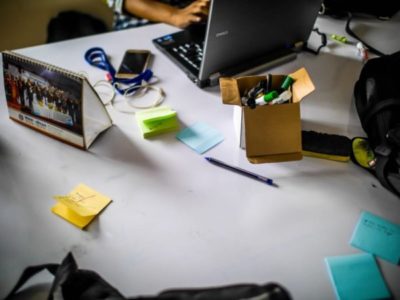Around midterms, our English professor told us to relax. He said that we had room to make mistakes and that we could rest a little easier knowing that such room exists. But he acknowledged that most of us wouldn’t take his advice. After all, it had been our anxious, perfectionist attitudes and ambition that had gotten us into our old, moneyed school in the first place, and we wouldn’t soon relinquish the attitude that had driven us to where we wanted to be.
I didn’t leave class intending to ignore him, but I couldn’t take his advice either. Platitudes meant to alleviate collegiate stress—relax, lower your shoulders, meditate mindfully, inhale only through one nostril at a time—never spoke to me because they never seemed to address what prevented me, and many others, from relaxing. Childhood reasons like growing up during the recession, and the anxiety I felt about money’s seemingly arbitrary disappearance and reappearance in our lives closed me off to the possibility of failure. Having a Singaporean mother whose standards were sky high didn’t help either. But there existed more immediate reasons too. College is expensive, and to let myself make a mistake would mean my parents wasted their money on me.
Failure couldn’t be an option. Not for me.
But the problem with treating failure like it isn’t an option is that you don’t acknowledge when you’re failing. The same semester that English professor told us we had room to make mistakes, I dug myself deeper and deeper into the hole that was my performance in Discrete Mathematics. Each class I went in and had no idea what was going on. I didn’t understand what I didn’t understand, and the questions I asked in class revealed my basic ignorance so plainly that I became too embarrassed to speak. Because of my class and work schedule, I could barely make any office or TA hours to get the help I needed. I guessed my way through homework, emulated proofs in the textbook without understanding them, and with each comically bad grade I got back, I convinced myself that I would try harder the next week and get an A; if I got As for the rest of the semester, I thought to myself, then I could get an A-, or maybe a B+, or maybe a B-.
My system of guesswork and magical thinking worked until the midterm. I cried in the middle of the classroom while other people politely continued their work, their mechanical pencils squeaking against the paper.
Curved, my midterm grade was about 40 percent. I ended up dropping the class. Getting the forms signed was embarrassing—I sheepishly told my very kind professor that I was not good at math, and she flinched a little (there were so many different kinds of math!)—but I didn’t die. I wasn’t thrown out of college; I wasn’t relegated to some hellish place full of people branded capital “F”s for being failures. In fact, I think I was fine. I still think that the world allows little room for human failure—too little, and not just in academic settings—but it seemed I had more room to make mistakes than I thought. Of course, I still feel ashamed when I get an B+ on a paper. Baby steps.



















